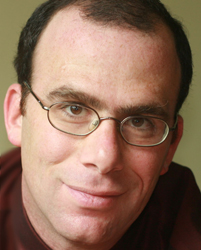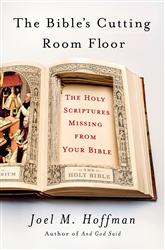Join a community of readers who are committed to Jewish stories
Sign up for JBC’s Nu Reads, a curated selection of Jewish books delivered straight to your door!
by Rabbi Lawrence A. Hoffman
A frequent speaker at synagogues and JCCs, Joel M. Hoffman, Ph.D., authored two books before writing his most recent book, The Bible’s Cutting Room Floor (Thomas Dunne Books / St. Martin’s Press), and has collaborated with his father, Rabbi Lawrence A. Hoffman, on over a dozen other works, including the National Jewish Book Award winner My People’s Prayer Book (ten volumes, Jewish Lights Publishing).
 Lawrence A. Hoffman: Why did you write a book about what didn’t make it into the Bible?
Lawrence A. Hoffman: Why did you write a book about what didn’t make it into the Bible?
Joel M. Hoffman: The more I read these ancient texts, the more I fall in love with them. They enlighten our reading of the Bible and offer compelling accounts that speak to the human condition with surprising insight.
LAH: For example?
JMH: I especially like the Life of Adam and Eve, a vivid description of what happens to the first man and woman after they’re expelled from the Garden of Eden. The narrative also explores the kind of unexpected sorrow that everyone faces eventually. I have a whole chapter on that.
LAH: What else jumps out at you?
JMH: The sources clarify so many details about the Bible. The Tower of Babel was deliberately waterproofed to withstand another flood, for example, but without these texts, the only way you’d know it is if you happen to be an expert in ancient materials science.
LAH: If these passages from the cutting room floor had become the canon instead of what we have, would western civilization be different?
JMH: What a fascinating question! For one thing, people would have a different view of misfortune, which most people today intuitively see as a punishment. “Why me,” they ask when something goes wrong. Or, “what did I do to deserve this?” They get that from Deuteronomy. But this classical notion of reward and punishment was only one understanding of misfortune back then. The texts on the Bible’s cutting room floor highlight others: Suffering is simply part of human life, neither deserved nor undeserved. Or people were not supposed to suffer at all, but God’s world is slightly out of control. If alternative approaches like these hadn’t been whitewashed from mainstream Judaism and Christianity, people today might have better tools to understand life and cope with its traumas.
 LAH: How does this book relate to your translation work?
LAH: How does this book relate to your translation work?
JMH: As I was growing up, you taught me by personal example to appreciate my heritage and to pursue learning. My translation work is driven by a desire to use that learning to show people the original beauty of the Bible.This is too.
LAH: You have no idea how proud I am of you as your father. I remember how you used to help me copy-edit my books when you were young. Now you’re writing your own. It’s a joy to see.
JMH: That’s not a question.
LAH: No, it’s not. I get to do that. I’m your father.
JMH: I love you, Dad.
Rabbi Lawrence A. Hoffman, Ph.D., is a two-time recipient of the National Jewish Book Award, and has written or edited more than 40 books, including over a dozen that include his son. His latest such work, All the World (Jewish Lights Publishing), focuses on the High Holiday themes of particularism and universalism.
Related Content: